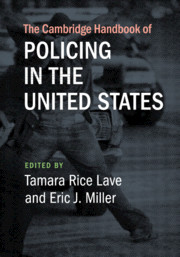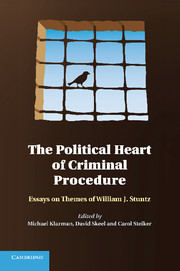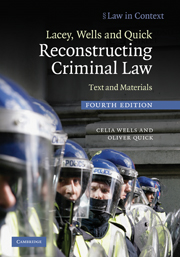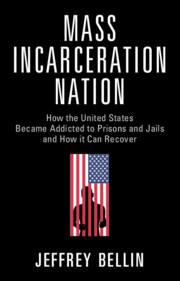The Cambridge Handbook of Policing in the United States
Part of Cambridge Law Handbooks
- Editors:
- Tamara Rice Lave, University of Miami School of Law
- Eric J. Miller, Loyola School of Law, Los Angeles
- Date Published: September 2020
- availability: Available
- format: Paperback
- isbn: 9781108430500
Paperback
Other available formats:
Hardback, eBook
Looking for an inspection copy?
Please email [email protected] to enquire about an inspection copy of this book
-
The Cambridge Handbook of Policing in the United States provides a comprehensive collection of essays on police and policing, written by leading experts in political theory, sociology, criminology, economics, law, public health, and critical theory. It unveils a range of experiences - from the police chief of a major metropolitan force to ordinary people targeted for policing on the street - and asks important questions about whether and why we need the police, before analyzing the law of policing, police use of force, and police violence, paying particular attention to the issue of discrimination against marginalized and vulnerable communities at the blunt end of police interference. The book also discusses technological innovations and proposals for reform. Written in accessible language, this interdisciplinary work will be a valuable resource for anyone interested in understanding the present and future of policing in the United States.
Read more- Provides first-hand accounts from police officers and the people they police, discussing their experience of policing
- Focuses on discrete, marginalized communities and the challenges they face from the police
- Breaks down academic barriers by approaching policing from multiple perspectives: empirical, normative, and legal
- Engages in a broad and forward-looking account of the impact of technology on policing, enabling readers to understand the ways that the police are responding to high-tech innovations, and the legal and political challenges they pose
Reviews & endorsements
'This is not your average book about policing. It draws from a wide range of disciplines - not just law and criminology, but political science, sociology and economics - to provide a rich tapestry of insights into what policing is, its benefits and dangers, and how it should change. If you want to understand modern debates about policing, including whether it should continue to exist at all, this book is a must read.' Christopher Slobogin, Milton Underwood Professor Law, Vanderbilt University Law School
See more reviews'This important and compelling book brings together the nation's leading experts on the law, political theory, sociology, and criminology of policing. The authors tackle some of the most urgent contemporary debates in policing, including uses of force, technological innovations, street level police practices, and reform proposals. This book is required reading for anyone interested in the law and practice of policing in the United States.' L. Song Richardson, Dean of University of California Irvine School of Law
'This volume provides an excellent array of perspectives on policing in 28 essays by an impressive collection of respected authors. They deal with the good and bad aspects of operation of police on the street and provide strong understanding of the problems and approaches to improving their performance in the diverse communities of America.' Alfred Blumstein, Carnegie Mellon University
'This sophisticated collection brings together a rich group of thinkers and viewpoints. Offering an elegant mix of policy expertise, community perspectives, social science, legal theory, and philosophy, it is at once critical and appreciative of the complex role played by policing throughout our democracy. The book is strongly interdisciplinary - it melds scholarship on social vulnerability and race with inquiries into such wide-ranging topics as police unions, technology, big data, and violence. Scholars, students, and experts alike will learn much from this provocative volume.' Alexandra Natapoff, University of California and author of Punishment Without Crime: How Our Massive Misdemeanor System Traps the Innocent and Makes America More Unequal
Customer reviews
Not yet reviewed
Be the first to review
Review was not posted due to profanity
×Product details
- Date Published: September 2020
- format: Paperback
- isbn: 9781108430500
- length: 613 pages
- dimensions: 253 x 176 x 32 mm
- weight: 1.162kg
- contains: 18 b/w illus. 10 tables
- availability: Available
Table of Contents
Part I. The View from the Streets:
1. Policing as though the public really matters: a call for outcome-based policing Cameron McLay
2. Policing in St Louis: 'I feel like a runaway slave sometimes' Thomas Harvey and Janae Staicer
Part II. Do We Need Public Police?:
3. Why we need police Justin McCrary and Deepak Premkumar
4. Police abolitionist discourse? Why it's been missing (and why it matters) Jonathan Simon and Eduardo Bautista Duron
5. The police as civic neighbors Eric J. Miller
6. Pretext and justification: republicanism, policing, and race Ekow Yankah
7. The private policing paradox Elizabeth Joh
Part III. The Law of Policing:
8. Justifying police practices: the example of arrests Rachel Harmon
9. Police interrogation and suspect confessions Richard A. Leo
10. How fear shapes policing in the US David A. Harris
11. The futile Fourth Amendment: understanding police excessive force doctrine through an empirical assessment of Graham v. Connor Osagie K. Obasogie and Zachary Newman
12. The problematic prosecution of an Asian American police officer: notes from a participant in People v Peter Liang Gabriel J. Chin
Part IV. Police Force and Police Violence:
13. Confrontational proactive policing: benefits, costs, and disparate racial impacts Charles Manski and Daniel S. Nagin
14. Race, police, and the production of capital homicides Jeff Fagan and Amanda Geller
15. What drives variation in killings by urban police in the United States – two empirical puzzles Franklin Zimring
Part V. Discrimination:
16. Race, pedestrian checks, and the Fourth Amendment Devon W. Carbado
17. In the shadows: policing immigration in the criminal justice system and its impact on racial disparities and identity Yolanda Vázquez
18. Policing 'radicalization' Amna Akbar
19. Police and the criminalization of LGBT people Ilan H. Meyer, Naomi G. Goldberg, Amira Hasenbush, Christy Mallory and Lara Stemple
20. Police sexual violence Tamara Rice Lave
21. Policing the mentally ill in Los Angeles on the frontlines of transinstitutionalization Natalie Pifer
Part VI. Technology:
22. The pitfalls of police technology: a minority report Kami Chavis
23. Citizenship talk Bennett Capers
24. Predictive policing theory Andrew Guthrie Ferguson
25. Big data surveillance: the case of policing Sarah Brayne
Part VII. Reform:
26. Unions and police reform Stephen Rushin
27. Procedural justice and policing: four new directions Rebecca Hollander Blumoff
28. Moving toward an American police-community reconciliation framework David Kennedy and Jonathan Ben-Menachem.
Sorry, this resource is locked
Please register or sign in to request access. If you are having problems accessing these resources please email [email protected]
Register Sign in» Proceed
You are now leaving the Cambridge University Press website. Your eBook purchase and download will be completed by our partner www.ebooks.com. Please see the permission section of the www.ebooks.com catalogue page for details of the print & copy limits on our eBooks.
Continue ×Are you sure you want to delete your account?
This cannot be undone.
Thank you for your feedback which will help us improve our service.
If you requested a response, we will make sure to get back to you shortly.
×





